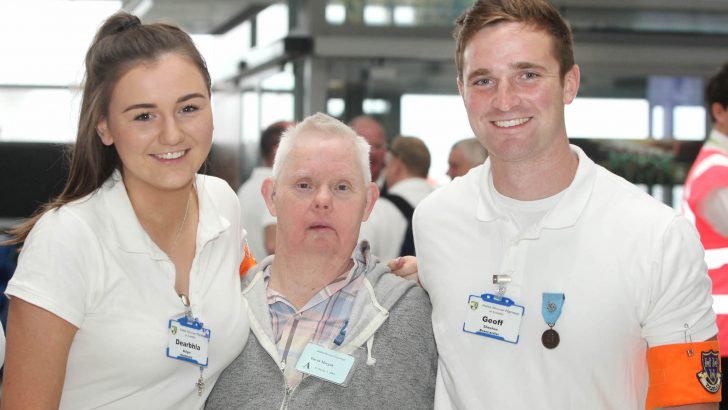Four years ago, I was asked to accompany a group of sixth-year girls to Lourdes as part of the Dublin Diocesan Pilgrimage.
A whole world unfolded for me, and every year since, I have discovered different aspects.
This year, there were 130 sixth-year volunteers, known as blueshirts, including two new schools – Coláiste Chill Mhantáin and Maryfield College.
There are also 300 volunteers, known as whiteshirts, mostly college students and young adults, who not only volunteer but pay their own fares.
Two of my former students, for example, worked in catering, which involved among other things making hundreds of sandwiches every day.
There are also 650 adult volunteers, who do everything from staffing an information office, to working on wards or the refectory, to doing the laundry.
Then there are those who work nearly all year round to make the entire pilgrimage happen.
Over 190 pilgrims in need of most care stayed this year in the Accueil de Notre Dame, a kind of hybrid between a hospital and a hotel. The medical staff there are all volunteers too, some 45 nurses and eight doctors. However, many of the other 700 or so pilgrims who come and stay in hotels need support as well.
The Crosscare volunteers, known as the redshirts, care for these pilgrims, wheeling wheelchairs through the busy streets to get pilgrims to the many religious ceremonies. For the first time this year, blueshirts also helped with this task.
I did not expect to have to call on a redshirt, Michael, to come and collect one of my blueshirt students in a wheelchair from our hotel after she injured her foot, but he did so with the kind of calm kindness that you come to expect. (One of the downsides of Lourdes is that you smile at total strangers for days after you come home, expecting a smile in return.)
He took her to the Accueil where the medical staff could not have been more kind. An x-ray was needed, which led to discovering another hidden aspect of service.
I asked anxiously where the local Lourdes hospital was located and another volunteer called Katie offered to drive us. She told me that she was often there twice a day, transporting patients who, for example, need to attend for dialysis or other medical facilities unavailable in the Accueil.
Katie spends her time driving while in Lourdes, not just to the hospital and pharmacy, but collecting and delivering supplies from wholesalers and the hotels who kindly store some of the perishable goods.
A whiteshirt called Ed also accompanied us to act as translator, and was a calm and benign presence throughout.
Lourdes is not Paradise, of course. Human beings are human beings, and some people are snappy and officious whether they are at home or in Lourdes.
It is hard not to wonder about the future of the pilgrimage, though. Many of the selfless younger volunteers have no particular faith commitment and it is notable that some of them do not participate in the religious ceremonies.
This is despite having an excellent chaplaincy team with regular input to encourage them to participate as a pilgrim, not just as a helper.
These young people are exposed far more than their peers are to the Church at its best, with magnificent liturgies, beautiful music and non-stop service of the vulnerable. Yet somehow, they still do not engage with the full challenge, stopping short at service.
Their peers at home have no such advantages and are barraged with negative imagery of the Church. Lourdes must seem as alien as the moon to them.
So it is hard to see the same numbers wanting to travel as pilgrims in 20 or 30 years’ time.
And yet, Lourdes taps into something really profound. The combination of service and camaraderie draws hundreds of young Dubliners in the kind of numbers parishes can only dream of. It should be easier to transmit the Faith here than anywhere else, so why do obstacles remain?
It is something that all dioceses will have to take seriously and research. Passing on the Faith is a primary task and yet it does not fully happen even in Lourdes.
It does ‘take’ with some of the young volunteers, so to put it more positively, perhaps some time should be given to investigating why. Perhaps that knowledge could be used to help others.
I suspect it is a complex mix of personal readiness, family influence or perhaps the influence of other significant adults and peers.
The volunteers are wonderful young people. It would be truly amazing if more of them could return from Lourdes suffused with the knowledge that they are not just helpers, but are themselves infinitely loved by God and challenged to follow him in solidarity with others.


 Breda O'Brien
Breda O'Brien Pilgrim David Morgan with volunteers Dearbhla Bolger and Geoff Sheehan at Dublin Airport on Thursday morning for the Dublin Diocesan pilgrimage to Lourdes. Pic John Mc Elroy
Pilgrim David Morgan with volunteers Dearbhla Bolger and Geoff Sheehan at Dublin Airport on Thursday morning for the Dublin Diocesan pilgrimage to Lourdes. Pic John Mc Elroy